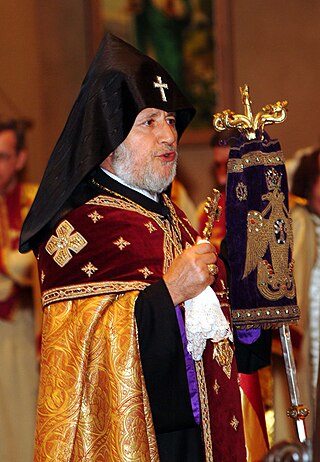Lists of leaders of major religions in any given century include:
| Leaders by century |
|---|
| Lists of office-holders |
These are articles that list people of a particular religious or political belief or other worldview.

The Catholicos of All Armenians is the chief bishop and spiritual leader of Armenia's national church, the Armenian Apostolic Church, and the worldwide Armenian diaspora. The Armenian Catholicos is also known as the Armenian Pontiff and by other titles. According to tradition, the apostles Saint Thaddeus and Saint Bartholomew brought Christianity to Armenia in the first century. Saint Gregory the Illuminator became the first Catholicos of All Armenians following the nation's adoption of Christianity as its official religion in 301 AD. The seat of the Catholicos, and the spiritual and administrative headquarters of the Armenian Church, is the Mother See of Holy Etchmiadzin, located in the city of Vagharshapat.
A Christian denomination is a distinct religious body within Christianity that comprises all church congregations of the same kind, identifiable by traits such as a name, particular history, organization, leadership, theological doctrine, worship style and, sometimes, a founder. It is a secular and neutral term, generally used to denote any established Christian church. Unlike a cult or sect, a denomination is usually seen as part of the Christian religious mainstream. Most Christian denominations refer to themselves as churches, whereas some newer ones tend to interchangeably use the terms churches, assemblies, fellowships, etc. Divisions between one group and another are defined by authority and doctrine; issues such as the nature of Jesus, the authority of apostolic succession, biblical hermeneutics, theology, ecclesiology, eschatology, and papal primacy may separate one denomination from another. Groups of denominations—often sharing broadly similar beliefs, practices, and historical ties—are sometimes known as "branches of Christianity". These branches differ in many ways, especially through differences in practices and belief.

Christianity in Lebanon has a long and continuous history. Biblical Scriptures purport that Peter and Paul evangelized the Phoenicians, whom they affiliated to the ancient Patriarchate of Antioch. Christianity spread slowly in Lebanon due to pagans who resisted conversion, but it ultimately spread throughout the country. Even after centuries of Muslim rule, it remains the dominant faith of the Mount Lebanon region and has substantial communities elsewhere.

Turkey has historically been a religiously diverse country, with about 20% of non-Muslims, making up the population, on the eve of World War I. The non-Muslim population significantly decreased following the late Ottoman genocides. There was a population exchange between Greece and Turkey, and the emigration of Christians and Jews, so that today, Islam is the largest religion in Turkey. According to the state, 99.8% of the population is initially registered as Muslim. As much as 90% of the population follows Sunni Islam. Most Turkish Sunni Muslims belong to the Hanafi school of jurisprudence. The remaining 0.2% are Christians and adherents of other officially recognised religions like Judaism. The official number of Muslims include people who are irreligious; converted people and anyone who is of a different religion from their Muslim parents, but has not applied for a change of their individual records. These records can be changed or even blanked out on the request of the citizen using a valid electronic signature to sign the electronic application.

Christianity is the predominant religion in Georgia. The wide variety of peoples inhabiting Georgia has meant a correspondingly rich array of active religions in the country.

In 2020, 85.84% of the population adhered to Christianity, 11% were Muslim, 0.1% were Jewish, 0.04% were Baha'i and 3% had no religious beliefs. Other religious groups include Jehovah's Witnesses and Yazidis. Orthodox churches serving other non-Georgian ethnic groups, such as Russians and Greeks, are subordinate to the Georgian Orthodox Church.
Articles related to Christianity include:
Luodao or Luoism (罗教), originally Wuweiism (无为教), refers to a Chinese folk religious tradition, a wide range of sect organisations flourishing over the last five hundred years, which trace their origins back to the mystic and preacher Luo Menghong (1443–1527), the Patriarch Luo and the revelation contained in his major scripture, the Wǔbùliùcè, the official title of which is The Scroll of Apprehending the Way through Hard Work and that marked the beginning of the precious scrolls' tradition.